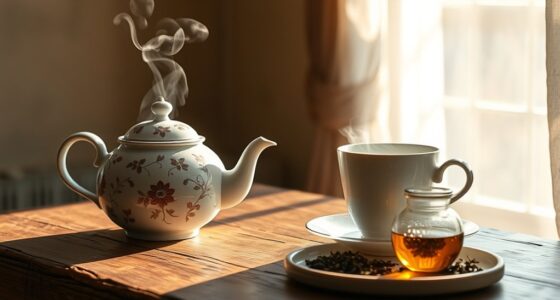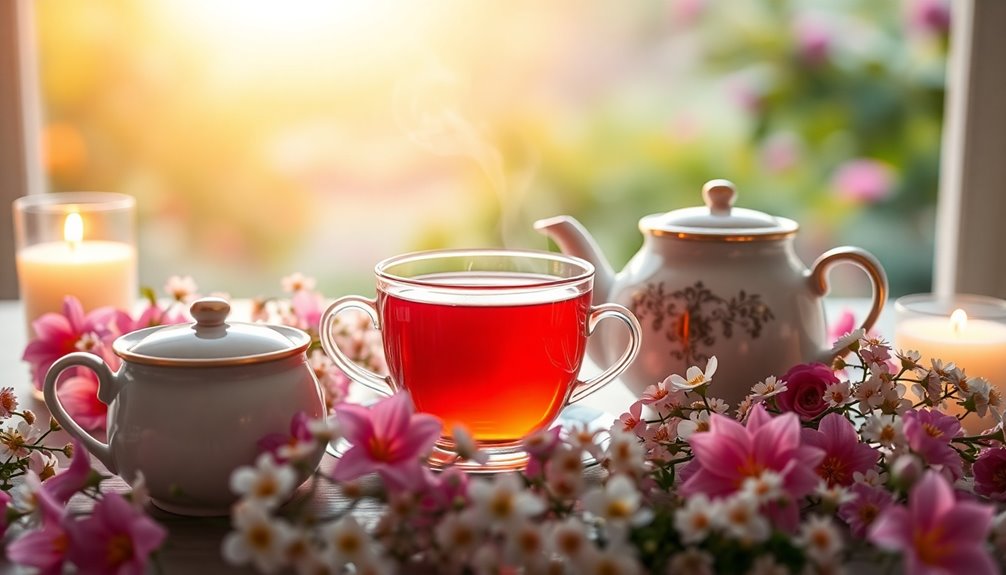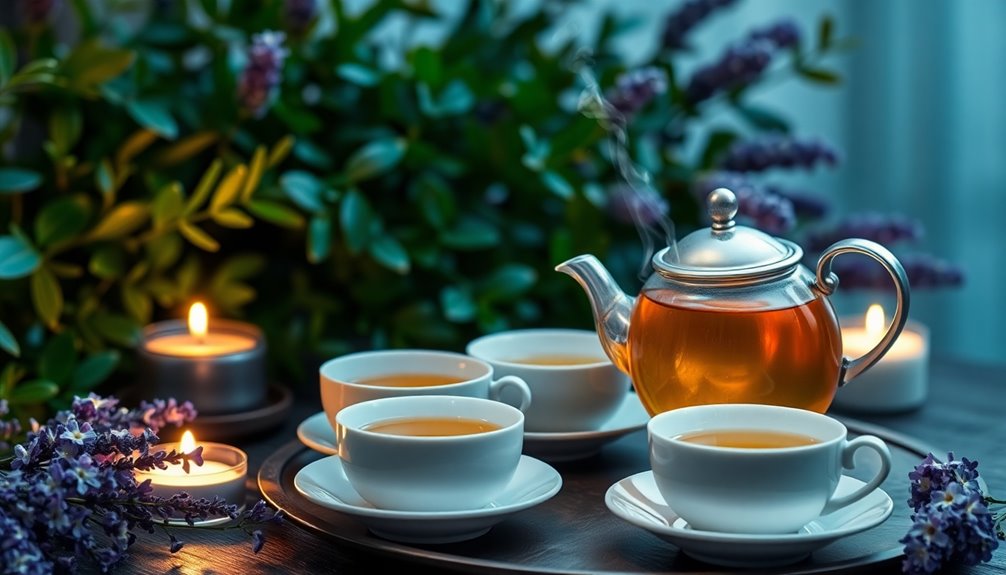For stress relief, herbal teas like chamomile soothe with floral sweetness, lavender offers calming floral aroma, peppermint energizes with minty freshness, and lemon balm provides citrusy cheer. Each tea has unique flavors and benefits that help ease tension and promote relaxation. Choosing the right one depends on your taste and stress relief goals. Keep exploring to discover how these herbal blends can enhance your calming routine and best suit your needs.
Key Takeaways
- Chamomile offers a mild, floral sweetness that promotes relaxation and is ideal for easing stress and anxiety.
- Lavender blends provide calming floral aromas, uplifting qualities, and support restful sleep.
- Peppermint delivers a refreshing, invigorating taste that alleviates tension and revitalizes mood.
- Lemon balm features a citrusy scent with mood-enhancing effects, reducing stress levels effectively.
- Herbal combinations, such as chamomile with lemon balm, enhance soothing properties and personalize relaxation benefits.

Feeling stressed lately? It’s a common experience, and a warm cup of tea might be just what you need to unwind. When you’re choosing teas for stress relief, herbal blends often come to mind because they’re naturally caffeine-free and packed with calming properties. But with so many options, how do you pick the right one? Understanding flavor profiles and the unique benefits of each herbal blend can help you find the perfect match for your relaxation routine.
Herbal teas are renowned for their soothing effects, and their flavor profiles play a significant role in their appeal. For instance, chamomile is a classic choice, offering a gentle, apple-like aroma with floral notes that evoke comfort. Its mild, sweet flavor makes it easy to sip slowly, encouraging relaxation. Similarly, lavender blends deliver a fragrant, floral aroma that’s both calming and uplifting, helping to reduce anxiety and promote restful sleep. Peppermint, with its cool, invigorating taste and revitalizing aroma, might seem more energizing, but it also helps ease tension and digestive discomfort, contributing to overall relaxation.
Herbal teas like chamomile, lavender, and peppermint offer soothing flavors that promote relaxation and calmness.
Another popular herbal blend is lemon balm, which presents a mild lemon scent paired with a subtle herbal taste. It’s known for its mood-enhancing effects and ability to reduce stress levels. Valerian root, often combined with other herbs, has a more earthy flavor profile and is highly regarded for its sedative properties, making it ideal if you’re struggling with insomnia or persistent anxiety. Passionflower, with its slightly sweet and grassy flavor, can also help calm nerves and promote a peaceful state of mind.
When you explore these herbal blends, think about how their flavor profiles affect your experience. Some people prefer the floral sweetness of chamomile and lavender to create a calming ritual, while others find the fresh, minty taste of peppermint more invigorating and mood-lifting. The key is to choose a tea that not only offers stress-relief benefits but also appeals to your palate. You might find that a combination of herbs, such as chamomile and lemon balm, provides a balanced, soothing effect with a pleasant flavor.
In addition, understanding the flushing mechanisms of modern teapots and kettles can enhance your brewing experience, ensuring optimal extraction of flavors and benefits. In the end, the best tea for you depends on your personal preferences and how each flavor profile makes you feel. Whether you’re sipping a gentle chamomile or a fragrant lavender blend, taking the time to enjoy your herbal tea can be a simple yet powerful way to reduce stress and restore calm. So, experiment with different herbal blends and discover which flavor profiles help you unwind the most.
Frequently Asked Questions
Which Tea Has the Fastest Calming Effect?
You’ll find that chamomile tea has the fastest calming effect because of its potent calming ingredients. Its natural compounds, like apigenin, quickly interact with your brain’s receptors, promoting relaxation. The tea’s potency allows it to soothe nerves rapidly, making it ideal when you need immediate stress relief. Drinking a warm cup of chamomile can help you unwind swiftly, thanks to its effective calming ingredients that work quickly on your system.
Are Herbal Teas Caffeine-Free?
Yes, herbal teas are generally caffeine-free, making them ideal for relaxation and stress relief. Their herbal tea benefits include soothing properties that help calm your mind without the stimulating effects of caffeine. When choosing herbal teas, you get the advantage of enjoying flavorful, natural remedies that promote relaxation and better sleep. So, if caffeine content is a concern, herbal teas are a safe, calming choice to incorporate into your routine.
Can Tea Help With Chronic Stress?
Yes, tea can help with chronic stress by supporting your stress management efforts. Choosing the right tea selection, such as calming herbal teas like chamomile or lavender, can promote relaxation and reduce anxiety. Incorporate these teas into your daily routine to enhance your stress relief strategies. While tea isn’t a cure, it can be a comforting part of your overall approach to managing chronic stress effectively.
How Much Tea Should I Drink Daily for Relaxation?
Think of your daily tea consumption as a gentle lullaby for your nerves; drinking 2-3 cups a day maximizes relaxation benefits without overdoing it. This amount helps soothe stress and promotes calmness, similar to a warm embrace from a trusted friend. Be mindful of caffeine, and opt for herbal teas like chamomile or lemon balm for ideal relaxation. Balance is key to enjoying the calming effects of tea daily.
Are There Any Side Effects From Stress-Relief Teas?
You might experience side effects from stress-relief teas, especially if you have ingredient sensitivities or concerns. Some herbs, like chamomile or valerian root, can cause allergic reactions or drowsiness. Always check the ingredients, start with small amounts, and observe how you feel. If you notice any adverse effects, stop drinking the tea and consult a healthcare professional to verify it’s safe for you.
Conclusion
Remember, the best tea for stress relief depends on your personal preference, but don’t forget—sometimes, the simplest remedy is the most effective. Whether it’s chamomile, lavender, or green tea, taking time to relax with your chosen brew can make a difference. As the saying goes, “A happy mind is a healthy mind.” So, sip mindfully, unwind fully, and trust that a little calm each day can truly transform your stress into serenity.










